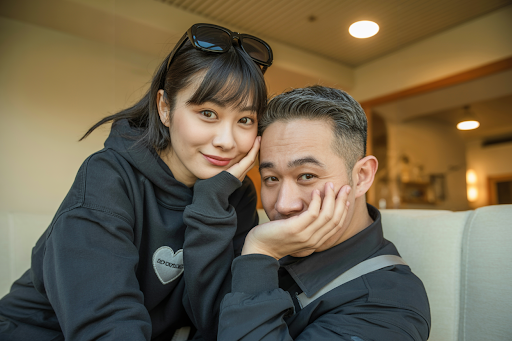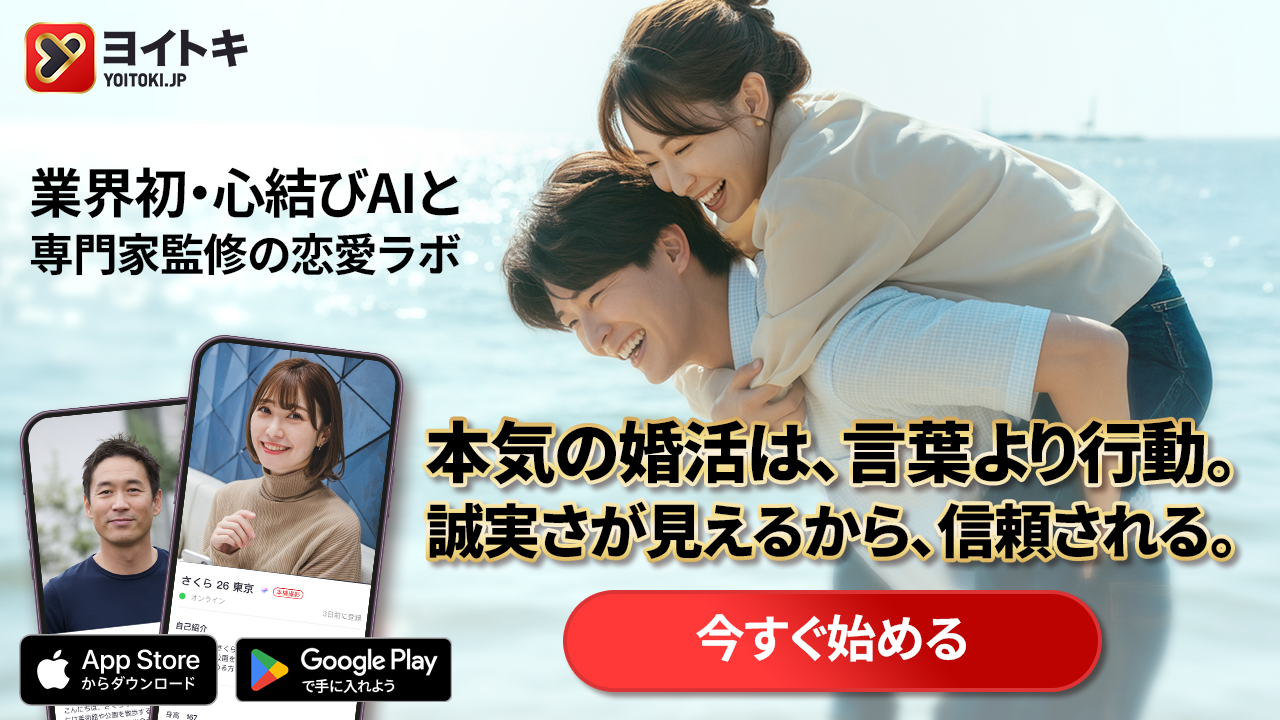목차
1. 상호 노력이라는 제스처: 진지함은 행동에서 비롯된다
3. 선진적인 관계성 인텔리전스: 궁합을 깊이 파고드는 질문
당신은 지금 스마트폰을 손에 쥐고 수많은 메시지와 프로필을 앞에 두고 조용한 피로감을 느끼고 있지 않나요?
“휴일에는 무엇을 하시나요?” “좋아하는 음식은 무엇인가요?” “어떤 음악을 듣나요?” — 이런 표면적인 “좋아하는 사람 질문”의 교류를 반복하는 과정에서 “이 사람은 정말 진지한 건가?” “우리의 미래는 일치할까?”라는 근본적인 의문이 항상 마음 한 편에 자리잡고 있을지도 모릅니다.
이것이 현대 데이팅에서의 최대 패러독스입니다. 선택지는 무한히 넓어졌지만, 진정한 연결을 찾는 것은 점점 더 어려워지고 있습니다. 낮은 노력의 스와이프 문화가 만연하는 가운데, 우리는Yoitoki요이트키가 단순한 만남이 아닌, 목적이 있는, 감정적으로 성숙한 파트너십을 구축하는 것을 목표로 하고 있습니다.
Yoitoki요이트키의 철학은 “전문가의 안내, 감정의 평등” 입니다. 우리는 단순한 데이트 팁을 제공하는 상담사가 아닙니다. 심리학, 사회학, 그리고 가토타이산 씨가 제안한“성숙한 사랑”의 원칙에 따라 당신의 데이팅을“의도적인 커뮤니케이션”으로 발전시킵니다.
이 기사는 안정 지향적인 30대~40대 남성과 일관된 노력과 진지한 교제를 원하는 20대~30대 여성, 그리고 일본에서의 문화를 존중하는 파트너십을 원하는 국제적인 멤버를 위해 작성되었습니다. 모호함을 없애고 진지한 의도와 깊은 궁합을 간파하기 위한 대화 기술을 구체적인 사례와 함께 깊이 탐구해봅시다.

1. 상호 노력이라는 제스처: 진지함은 행동에서 비롯된다
일본 문화의 “察し”가 만들어내는 모호함과 이를 넘어서는 “의도적인 배려”
일본에는 오래전부터 “察し”의 문화가 있으며, 말하지 않은 의도를 읽어내는 것이 미덕으로 여겨집니다. 그러나 데이팅의 초기 단계에서 이 “察し”에 너무 의존하게 되면 “상대방이 얼마나 진지한 노력을 하고 있는가”라는 중요한 정보를 놓치게 됩니다. 결과적으로 모호한 관계가 지속되고, 어느 한쪽의 기대가 배신당하게 됩니다.
Yoitoki요이트키에서는 “상호 노력(상호노력)”을 신뢰 구축의 첫 번째 단계로 생각합니다. 진지한 관계는 한 사람의 노력으로 유지되는 것이 아니라, 두 사람이 동등하게, 일관되게 보여주는 행동에 의해 지탱됩니다. 이는 마치 집을 짓는 것과 같습니다. 한쪽이 설계도를 그리는 것만으로는 충분하지 않고, 두 사람이 벽돌을 쌓는 의지가 있어야 단단한 집이 완성되는 것입니다.
특히 경제적, 감정적으로 안정된 30대, 40대 남성이 초기 데이트에서 교통비나 식사비를 부담하는 행위는 단순한 매너가 아닙니다. “당신의 시간과 존재에 가치를 부여하고, 책임을 가지고 이 시간을 에스코트하겠다”는 명확한 의도의 표명입니다. 이 행위는 프로포즈의 연습이라고도 할 수 있으며, 진지함의 첫 신호입니다.
그리고 이 노력에 대해 20대, 30대 여성은 “구체적인 감사”와 “다음 기회에 대한 제안”으로 응답하는 것이 상호 노력의 캐치볼을 완성하게 됩니다. 상대방의 노력을 당연하게 여기지 않고, 그 이면에 있는 배려를 평가하며, 자신도 관계 구축에 기여하고자 하는 의지를 나타내는 것이 필수적입니다.
겐타(38세)와 미사키(29세)의 경우
겐타는 직장에서 성공을 거두었고, 진지하게 미래를 함께할 수 있는 여성을 찾고 있었습니다. 그러나 지금까지의 데이트에서는 상대방이 단지 수동적이라는 것에 불안감을 느끼고 있었습니다. 그의 노력이 정당하게 평가되지 않고 있다고 느꼈기 때문입니다.
처음 미사키를 만난 날. 겐타는 미리 조사한 조금 고급스러운 레스토랑을 예약하고, 이동을 위한 비용도 스마트하게 지불했습니다. 데이트가 끝날 무렵 미사키는 단순히 “감사합니다”라고 말하는 것에 그치지 않고, 그의 “의도”를 평가하듯 이렇게 덧붙였습니다.
미사키: “오늘 정말 멋진 시간을 감사합니다. 겐타씨가 이렇게 시간을 들여 계획을 세워 주셨다는 것이 정말로 전달되었습니다. 단순한 식사가 아니라, 기분 좋은 경험을 설계해 주신 것이네요. 가능하다면 다음 카페는 제가 선택하게 해주세요. 저도 겐타씨가 모르는 좋은 곳을 소개하고 싶습니다.”
이 미사키의 반응은 겐타의 노력을 인정하고, 자신도 관계 구축에 기여하고 싶다는 의지 (상호 노력)를 보여주고 있습니다. 겐타는 이 순간 미사키가 다른 사람들과는 다른, “감정적으로 평등한” 파트너십을 이해하고 있다는 것을 느꼈습니다.
의도적인 상호 노력을 탐구하는 질문:
단순한 “좋아하는 사람 질문”을 넘어, 이 상호 노력의 정신을 탐구하기 위해 우리는 다음 질문을 추천합니다.
- “만약 서로의 주말 일정이 겹쳤을 때, 당신은 자신의 일정을 우선시합니까? 아니면 함께 시간을 보내기 위한 조정을 시도합니까? 그 조정에서 당신이 가장 중요하게 생각하는 것은 무엇입니까?”
- 이 질문은 단순한 취미 조정이 아니라, “생활 습관의 조율과 상호의 희생을 얼마나 평등하게 나누는가”라는, 가토타이산 씨가 말하는 “성숙한 사랑”의 핵심을 찌르는 것입니다. 자신의 시간뿐만 아니라 “우리”라는 공유의 시간을 얼마나 우선시할 수 있는지를 판단합니다.
- “금전적 가치관에 대해 여쭙겠습니다. 당신은 미래를 위한 저축이나 투자를 중시합니까? 아니면 현재의 생활을 충실히 하는 소비를 중시합니까? 그 균형을 어떻게 맞추는지 구체적으로 말씀해 주실 수 있나요?”
- 좋아하는 사람 질문에서는 절대 묻지 않는 이 질문은, 특히 안정성을 추구하는 30대, 40대 남성에게 매우 중요합니다. 금전 감각의 불일치는 결혼 생활에서의 가장 큰 파탄 원인 중 하나입니다. 두 사람의 생활 설계의 방향성이 일치하는지를 확인할 수 있습니다.
2. 의도의 명확성: 불확실성이라는 피로를 없애다
고스트화의 배경에 있는 모호함의 연쇄와 목적을 가진 교제
현대 데이팅에서의 가장 큰 정신적 피로의 원인은 “의도의 모호함”입니다. 한쪽이 “캐주얼한 관계”를 원하고 다른 한쪽이 “진지한 관계”를 기대하는 경우, 시간의 경과에 따라 필연적으로 충돌이 발생하고, 그 결과 고스트화라는 형태로 관계가 단절됩니다. 고스트화는 받는 이에게 “내 시간 낭비가 발생했다” “진지한 마음이 짓밟혔다”는 깊은 상처를 남깁니다.
의도의 명확성(의도의 명확성) 이란 당신의 “관계의 목표”를 명확히 언어화하고 상대의 목표와 일치하는지를 확인하는 과정입니다. Yoitoki요이트키에서는 진지한 장기 파트너십을 원하는 사용자만을 환영함으로써 이 초기의 모호성을 대폭 줄이고 있습니다. 우리는 목적이 있는 교제를 권장합니다.
특히 일본에 거주하는 국제적인 멤버에게 있어 문화적 “본음과 건면”이 의도의 전달을 더욱 복잡하게 만듭니다. 그들이 진지한 교제를 원한다면 “장기 체류의 의도”나 “미래의 생활 설계”와 같은 구체적인 정보를 공개하는 것이 신뢰를 구축하는 데 필수적입니다. Yoitoki요이트키는 프로필이나 초기 메시지에서 이러한 정보를 명확히 표시할 것을 권장하고, 언어와 문화의 지원을 통해 오해를 예방합니다.
“5년 후의 관계성”을 묻는 대화 기술: 진지한 의도에 대한 피벗
모호한 관계에서 한 걸음 나아가기 위해 “좋아하는 사람 질문”의 단계를 졸업하고 다음의 구체적인 질문을 시도해보세요.
- (나쁜 질문의 예) “어떤 데이트를 좋아하나요?”
- (좋은 질문의 예) “저는 앞으로 정신적 안정과 서로를 높일 수 있는 파트너와 가정을 세우고 싶습니다. 당신은 5년 후 우리의 관계에 대해 어떤 비전을 가지고 있나요?”

시뮬레이션 대화:
화자 | 질문 | Yoitoki요이트키의 분석 |
당신 | “제 목표는 장기적인 파트너십입니다.5년 후의관계성에 대해, 당신은 어떤 비전을 가지고 있습니까?” | 의도를 명확히하고, 상대의 “생활의 설계도”에 접근하는 것입니다. |
상대A | “아, 아직 거기까지 생각하지 않았네요. 일단, 만나서 즐길 수 있으면 좋겠네요.” | 의도 불일치의 신호. 당신의 진지한 목표와는 아라인되지 않습니다. 시간의 낭비를 방지할 수 있습니다. |
상대B | “저도 안정을 추구하고 있습니다.5년 후에는, 둘이 함께 살고, 공통의 취미를 통해 성장하는 관계가 되어 있기를 원합니다. 일이 바쁘지만, 대화를 통해 시간을 확보하고 싶습니다.” | 의도 일치의 신호. 구체적이고, 상호 노력의 의사(대화를 통해 시간을 확보)도 나타나고 있습니다. |
이 질문은 상대의 “생활의 설계도” 를 묻는 것입니다. 답이 직장이나 경력 이야기밖에 없다면, “일을 통해 얻고자 하는 ‘안정’은 구체적으로 당신의 파트너십의 가치관과 어떻게 연결됩니까?”라고 깊이 파고들어 그의 가치관이 어디에 있는지를 탐색할 수 있습니다.
“의도의 명확성”은 서로의 시간을 존중하는 행위이며, 진지함의 증거입니다.
Kokoromusubi (심결비)는 표면적인 “좋아함”의 그 다음을 찾습니다
당신이 지금 직면하고 있는 “왜 이 대화는 진전이 없는가?”라는 과제는 바로 우리가 Kokoromusubi (심결비)를 개발한 근거입니다.
기존의 데이팅 앱이 “여행을 좋아한다”나 “영화를 좋아한다”는 표면적인 정보(좋아하는 사람 질문의 답)로 매칭시키는 반면, Yoitoki요이트키의 선진적인 관계성 인텔리전스 AI는 그 깊은 곳을 파고듭니다.
심결비는 다음의 깊은 궁합(신소아이소)을 분석합니다.
- 스트레스에 대한 대처법: 어려운 상황에 직면했을 때 상대는 감정적으로 되는가, 아니면 논리적으로 해결을 도모하는가.
- 배려의 방식: 상대는 말로 격려하는 타입인가, 아니면 행동으로 지지하는 타입인가.
- 핵심적인 윤리관과 가치관: 금전 감각, 가족관, 사회에 대한 기여 의식.
심결비는 당신이 무의식적으로 찾고 있는 “안정감”이나 “신뢰”와 같은 영원히 지속되는 관계의 토대가 되는 요소를 특정합니다. 그것은 일시적인 흥분이나 설렘이 아니라, 당신의 “진정한 생활”에 매끄럽게 맞는 파트너를 찾아내기 위한 과학적이고 심리학에 기반한 접근입니다.
[당신의 진정한 궁합을 Yoitoki요이트키에서 발견하기 →]
3. 선진적인 관계성 인텔리전스: 궁합을 깊이 파고드는 질문
“안정감”과 “신뢰”를 구축하기 위한 대화와 성숙한 사랑
가토타이산 씨의 제안하는 “성숙한 사랑” 은 “불안의 해소” 와 “신뢰에 기반한 안정감”이 바탕에 있습니다. 이는 감정적으로 성숙한 파트너를 만나고 싶어하는 20대, 30대 여성들이 가장 중요하게 여기는 요소입니다. 일시적인 친절이 아니라, 시련에 견딜 수 있는 일관성이 요구됩니다.
진지한 교제를 지향하는 남성은 이 안정감을 대화를 통해 제공하는 방법을 배울 필요가 있습니다. 이는 상대의 감정적 필요와 경계선(개인 공간)을 존중하며 처음부터 오픈하게 대화하는 것에서 시작됩니다.
감정적 필요를 탐구하는 대화 기술
1. 사랑 표현의 형태를 묻다: “소중하게 여겨지는 것”의 정의
우리는 모두 서로 다른 방법으로 사랑을 받고 표현합니다. 당신이 좋다고 생각한 행동이 상대에게는 “노력”으로 인식되지 않을 수 있습니다.
- 질문: “저에게 있어 ‘배려’는 일정이 조금 변경될 때 미리 연락을 주는 것인데, 당신은 상대방에게 어떻게 행동을 하면 ‘소중하게 여겨진다’고 느끼나요?”
- 구체적인 사례와 깊이 파고들기: 상대가 “서프라이즈를 좋아한다”고 대답했다면, 더 나아가 “서프라이즈 없이도 일상적인 작은 것들에서 일관성이 있는 것과 어떤 것이 더 중요합니까?”라고 물어보세요. 진지한 관계를 원하는 사람은 일시적인 큰 제스처보다 매일의 안정된 배려를 평가할 것입니다.

2. 경계선과 독립성의 존중: “혼자 있는 시간”의 필요성
성숙한 관계는 서로의 자립을 인정하는 것에서 시작됩니다. 특히 경력을 가진 사람들과 자신의 시간을 소중히 여기는 사람들에게 이 경계선의 설정은 매우 중요합니다. 파트너의 존재가 자신의 성장이나 휴식을 방해하는 “짐”이 되어서는 관계가 지속될 수 없습니다.
- 질문: “저는 가끔 집중하고 싶거나 생각하고 싶은 것이 있어서 혼자 있는 시간이 필요합니다. 당신은 파트너의 혼자 있는 시간에 대해 얼마나 필요하다고 느끼나요? 서로 어떻게 존중할 수 있을까요?”
- 분석: 이 질문에 대한 답이 “전혀 필요 없다” “항상 함께 하고 싶다”는 극단적인 것이라면, 공존적 경향이 있을 수 있습니다. 반대로 “필요한 때는 연락도 하고 싶지 않다”는 대답이라면 관계에 대한 약속이 낮을 가능성이 있습니다. 가장 건강하고 성숙한 대답은 “필요성을 이해하되, 미리 커뮤니케이션을 통해 불안을 방지한다”는 것입니다. 이를 통해 향후 동거나 결혼 생활에서의 “공간 공유” 문제를 사전에 방지할 수 있습니다.
3. “실패”와 “사과”에서 배우는 자세: 관계의 회복력
완벽한 인간은 없습니다. 진지한 관계에서 중요한 것은 어려움에 직면했을 때의 대응과 책임지는 방식, 즉 “회복력(회복력)”입니다. 가토타이산 씨가 말한 대로 사랑은 “항상 잘 되는 것”이 아니라 “잘 되지 않았을 때, 어떻게 다시 일어설 수 있는가”에 달려 있습니다.
양코(32세)와 테츠야(41세)의 경우: 충돌과 수습
어느 날, 테츠야는 직장에서의 스트레스로 인해 양코에게 평소 말하지 않는 거친 말을 해버렸습니다. 양코는 깊이 상처를 받고 메시지의 답장을 중단했습니다.
이때 테츠야의 대응은 그의 감정적 성숙도를 측정하는 결정적인 순간이었습니다.
테츠야는 (Yoitoki요이트키 철학에 기반한 대응):
“어젯밤은 정말 죄송합니다. 직장에서의 스트레스를 당신에게 부딪히게 해서는 안 되었어요. 원인은 완전히 제게 있습니다. 당신의 마음을 깊이 상처 입혔다는 것을 진심으로 반성하고 있습니다. 감정적으로 되기 전에 잠시 진정하고 대처했어야 했습니다. 앞으로는 미리 ‘오늘은 조금 피곤하다’고 말씀드려 불쾌한 기분을 느끼지 않도록 하겠습니다. 제가 어떻게 이 신뢰를 회복할 수 있을지 알려주실 수 있나요?”
이 대응에 포함된 요소:
- 책임의 명확화: “원인은 완전히 제게 있습니다.”
- 개선 방안의 제시: “앞으로는 미리 ‘피곤하다’고 말씀드리겠습니다.”
- 해결을 위한 공동 의식: “신뢰를 회복하는 방법을 알려주세요.”
이는 데이트 대화에서 직접적으로 질문할 수 있습니다.
- 질문: “만약 서로의 신뢰 관계가 흔들릴 정도로 큰 실수를 당신이 저질렀다면, 당신은 먼저 저에게 어떤 행동을 취하나요? 그때 당신은 감정적인 해결(사과, 공감)과 실무적인 해결(재발 방지책) 중 어떤 것을 더 중시하나요?”
- 분석: 그의 대답이 “성실한 사과”와 “구체적인 개선책의 제안”을 동시에 이룰 수 있다면, 그 사람은 성숙한 회복력을 갖고 있다고 평가할 수 있습니다.

4. 품질과 안전: 진지한 사람만 모이는 커뮤니티
낮은 노력과 거래적 의도를, Yoitoki요이트키의 인증 프로세스가 필터링합니다.
진지한 교제를 원하는 사람들이 가장 피하고 싶은 것은 “낮은 노력” 과 “거래적” 의도를 가진 사용자와의 접촉입니다. 쓸데없는 노력과 마음의 에너지를 소비하는 것은 데이팅의 큰 해입니다.
Yoitoki요이트키가 다른 플랫폼과 결정적으로 다른 점은 그엄격한 “품질과 안전”에 대한 헌신입니다. 우리는 단순한 ID 인증을 넘어서 사용자가 진지한 장기 파트너십에 대한 의도를 명확히 나타내도록 요구하는 독자적인 온보딩 프로세스를 도입합니다.
Yoitoki요이트키가 제공하는 품질과 안전:
- 의도의 사전 필터링:
- 우리의 심사 프로세스는 사용자에게 “당신이 이 앱에서 추구하는 궁극적인 관계의 목표는 무엇인가”를 깊이 묻습니다. 이 시점에서 모호한 관계나 놀이라는 목적의 사용자는 자연스럽게 필터링됩니다.
- 이에 따라 사용자는 “좋아하는 사람 질문”을 하기 전에 이미 상대가 “진지하다”는 최소한의 보장을 얻게 됩니다. 진지한 교제에 대한 투자를 낭비하지 않습니다.
- 문화와 에티켓의 명확화:
- 특히 국제적인 멤버에게는 일본의 데이팅 문화에서 배려해야 할 에티켓 (첫 데이트에서의 상호 노력의 표시, 연락 빈도의 적절한 균형 등)을 명확히 전달합니다. 이를 통해 문화적 배경의 차이에서 발생하는 오해나 불안을 최소화하고 안전하게 신뢰를 쌓을 수 있는 환경을 제공합니다.
- 커뮤니티 의식의 조성:
- Yoitoki요이트키의 사용자는 모두가 “의도적인 커뮤니케이션”을 중시하고 “상호 노력”의 원칙을 이해하는 사람들입니다. 이질 높은 커뮤니티에서 당신은 안심하고 자신을 드러내고 본질적인 대화를 진행할 수 있습니다. 여기서 만나는 사람들은 당신의 시간과 감정을 존중할 준비가 되어 있습니다.
결론: 진지한 파트너십은 운이 아니라 의도로 선택한다
“좋아하는 사람 질문”에 대한 답을 찾기 위한 여행은 이제 끝내도록 합시다. 표면적인 공통점을 찾는 데 시간을 투자하는 것을 멈추고 상대의 가치관이나 생활 설계라는 본질적인 정보를 탐구하는 데 집중하십시오.
진지한 파트너십은 행운이나 우연에 의해 찾아오는 것이 아니라, 명확한 의도, 상호적인 노력, 그리고 상대의 본질을 간파하는 커뮤니케이션 기술에 의해 당신이 직접 선택하고 구축하는 것입니다.
우리는 이 기사에서 다음의 3가지 기둥에 기반한 의도적인 커뮤니케이션 기술을 소개했습니다.
- 상호 노력: 행동과 응답의 균형을 통해 진지함을 확인합니다.
- 의도의 명확성: 모호함을 없애고 5년 후의 관계라는 “생활의 설계도”를 공유합니다.
- 깊은 궁합: 어려운 상황에 대한 대응이나 사랑 표현의 형태를 통해 “안정감”과 “신뢰”를 탐구합니다.
만약 당신이 모호함이나 낮은 노력의 교류에 지쳐, 본질적인 연결과 상호 존중에 기반한 질 높은 관계를 원한다면, 당신의 커뮤니티는 이미 기다리고 있습니다. Yoitoki요이트키는 당신의 진지함을 이해하고 그것을 현실로 바꾸기 위한 최고의 도구와 환경을 제공합니다.

새로운 데이트 형식을 경험해보지 않겠습니까?
진지한 관계에 대한 열망을 확실한 현실로 만들고 싶지 않습니까?
Yoitoki요이트키는 모호함에 작별을 고하고 상호의 노력과 진정한 이해에 기반하여 관계를 구축하고자 하는 성실하고 감정적으로 성숙한 사람들이 모이는 곳입니다. 당신의 소중한 시간과 에너지를 진정으로 파트너십을 고려하는 사람들에게만 투자하세요.


